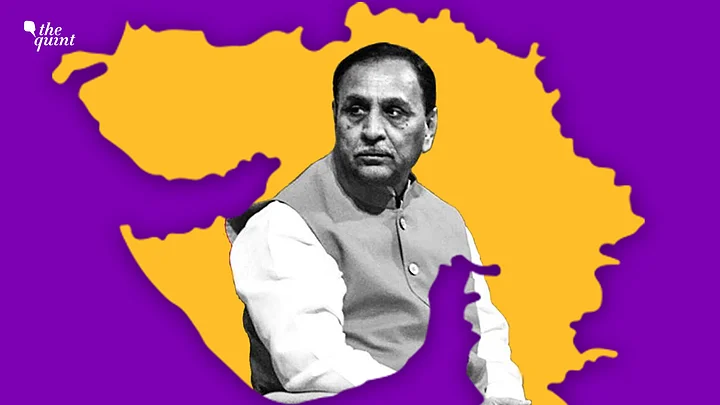Vijay Rupani was handed the chief minister’s portfolio on 7 August 2016, after the Bharatiya Janata Party (BJP) realised it needed a stronger leader to keep Gujarat in its kitty, given the absence of Narendra Modi, who had bigger fish to fry in New Delhi.
The pressure on Rupani was quite high in the run-up to the 2017 Assembly elections as Congress looked menacing under Rahul Gandhi’s renewed leadership while he relentlessly campaigned in Gujarat. Yet, the BJP won, and so did Rupani, who was once again elected from Rajkot (West).
As the Rupani government completes its first year in power on 26 December, The Quint takes a closer look at the highs and lows of Vijay Rupani’s regime in Narendra Modi’s Gujarat.
Low: An Uncomfortable Power-Sharing Arrangement
The equation shared by Vijay Rupani and his deputy Nitin Patel was often cited as an uncomfortable one, as Patel was touted to be CM Anandiben Patel’s replacement in 2016.
After winning the Assembly election in 2017, Dy Chief Minister Nitin Patel was visibly disgruntled by the portfolios issued to him – Roads and Buildings, Health, Medical Education, Narmada, Kalpsar and Capital Project. Patel had wanted to retain portfolios that he held before the Assembly elections such as finance and urban development.
Rumours were rife that Patel was planning to quit the BJP and several senior BJP leaders from the state met him to work out a compromise. Eventually, Patel was handed the finance portfolio after BJP national president Amit Shah intervened to avoid the embarrassment of public infighting between its two top leaders in Gujarat.
Low: Poor Water Management
Despite experiencing heavy rainfall in 2017, which resulted in massive flooding across North Gujarat, especially in Banaskantha district, Gujarat entered 2018 with a water crisis looming over its head. Fingers were pointed at the Rupani government for misusing water resources in the run-up to the 2017 Assembly elections.
According to the Central Water Commission, the water levels in reservoirs in 2018 were lower than the levels in 2017. Incidentally, an unusual amount of water was released in to Narmada between 12-17 September, just when Sardar Sarovar Dam was inaugurated by PM Modi on 17 September.
As the situation worsened in 2018, the state government declared that it would ration water during peak summer and both urban dwellers and farmers were severely affected.
In fact, Sardar Sarovar Narmada Nigam Limited (SSNNL) declared that it will not be responsible for any lossesto farmers due to lack of water in the Narmada canal. SSNNL also asked farmers not to prepare for summer crops with expectations of getting water for irrigation.
Low: The Groundnut Scam
During the 2017 Assembly Election campaign, the BJP promised Minimum Support Price (MSP) of Rs 4,500/quintal for groundnuts against the prevailing market price of Rs 3,700. Eventually, the state government purchased over 10 lakh metric tonnes of groundnuts worth Rs 4,000 crore.
The year 2018 started with a series of fires that gutted at least four groundnut warehouses in Saurashtra and Kutch, destroying stock worth at least Rs 50 crore. The situation hit rock bottom in August, when an inspection of a private warehouse in Saurashtra revealed that over 30,000 groundnut sacks weighing 35 kilos was adulterated with pebbles and sand.
The Leader of Opposition, Paresh Dhanani, while demanding Rupani’s resignation, has alleged that cooperative societies controlled by BJP supporters were picked for operating groundnut procurement centres. According to Dhanani, groundnuts of good quality were diverted to oil mills run by BJP supporters.
Even the National Agricultural Cooperative Marketing Federation of India Limited (NAFED) declared that it will not procure groundnuts in Gujarat due to irregularities in procurement in 2017.
In November 2018, Rupani conceded that there was indeed a scam in procuring groundnuts in 2017, and measures were being taken to ensure that such scams don’t recur.
High: Kunvarji Bavaliya Joins BJP
Koli community strongman Kunvarji Bavaliya joined the BJP in July this year, further strengthening the BJP’s foundations in Saurashtra. Bavaliya, who was Congress loyalist, was quite unhappy with Rahul Gandhi’s decisions in Gujarat Congress, which led to the appointment of young Paresh Dhanani as leader of opposition instead of a seasoned Bavaliya.
After the election, Bavaliya was immediately given three portfolios – water resources, rural housing development and animal husbandry – along with a Cabinet berth. Bavaliya won the Jasdan by-poll held on 20 December with a margin of over 19,000 votes.
With Bavaliya in the fold, the BJP feels more confident about its chances in Saurashtra in the 2019 general elections, as the region is dominated by the Koli Patel community. Saurashtra has seven key Lok Sabha seats including Rajkot, which Bavaliya won in the 2009 polls on a Congress ticket.
The victory in Jasdan also took BJP’s tally to 100 in the Gujarat Assembly.
